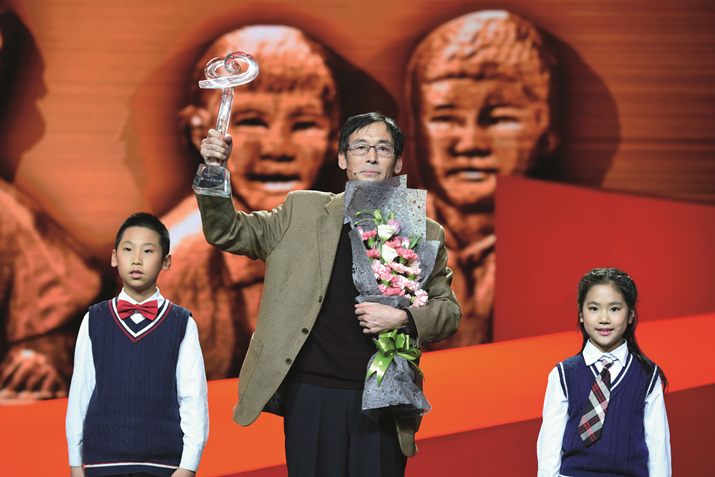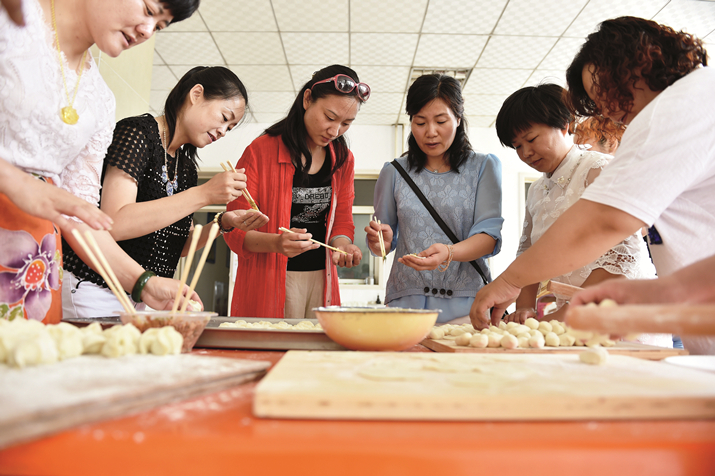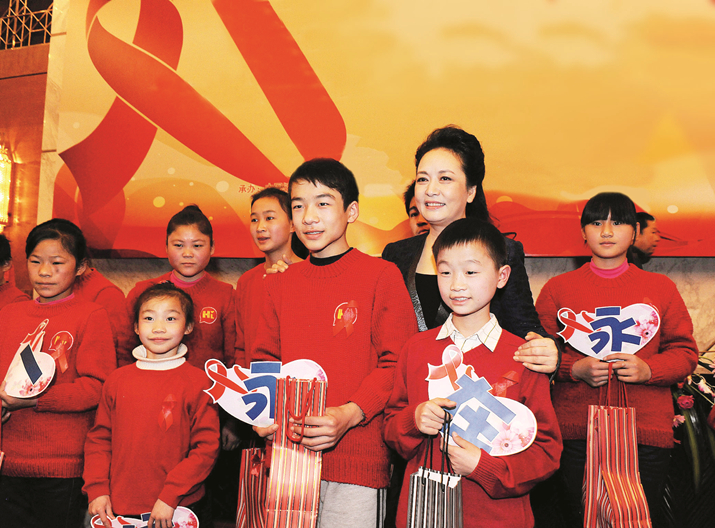|
|||||||||||
|
|
| From the Heart |
| A doctor strives to end discrimination against children living with HIV/AIDS |
| By Xia Yuanyuan | VOL.9 December 2017 ·2017-12-01 |

Guo Xiaoping wins the CCTV's annual Touching China award in February 2017
Sometimes an event can happen that changes the entire trajectory of a life's path. So it was when Guo Xiaoping, destined to become an eminent medical professional in his lifetime, met a group of children living with HIV/AIDS.
As the head doctor and administrator of the Third People's Hospital in Linfen, north China's Shanxi Province, 13 years ago, Guo noticed that there were children in his hospital being denied access to school because they were HIV positive. This prompted him to get involved and in 2004 he opened a Love Classroom in a vacant ward with some colleagues in his hospital. With a steady increase in the number of these students, he found sponsorship and in 2006, he launched the Linfen Red Ribbon School, the first of its kind in China that is dedicated to the education of HIV-infected children.
In 2015, Guo made a life changing decision to leave his position at the hospital and focus all his energy on the school. There are now 34 students on his roster, all of whom have lost their mothers and in some cases fathers as well. The boarding school provides a safe and welcoming environment for children living with HIV/AIDS. While serving as the school principal, Guo also takes on the role of a father figure.
The school has become widely known across the country. Peng Liyuan, who is a World Health Organization goodwill ambassador for tuberculosis and HIV/AIDS, paid a visit to the school and has given close attention to the children's growth and learning progress.
A happy family

In 2016, some volunteers in Red Ribbon School make dumplings for children
In February, the Touching China awards that recognize the country's most inspiring role models were announced. Guo Xiaoping was one of the 10 recipients.
"At the beginning, I felt that opening the school is to fulfill my social responsibility. However, it now only relates to love," the 58-year-old said. "I feel I am raising my own children, and I just want them to be happy," he added.
The school has led to heated social debates. Some believe it is discriminatory to isolate these children in a separate school. But according to Guo, the stigma attached to people living with HIV/AIDS has not yet reached a level of maturity where they are openly accepted into society.
"We need to consider the practical situation. If there is no such school, these children will be deprived of education," he said. "This is not discrimination, but taking cognizance of reality."
Guo has also been criticized for leaving his important position at the hospital to become a school principle. In response he said while he is not the only person who can run a hospital, at present, he is the only person who can run his school. "These children only recognize me," he said. Before entering the Red Ribbon School, Zeng Jing, a young girl who was an 8-year-old at the time, was sent to a regular school. But she was soon isolated when her classmates found out she was HIV-positive.
"I was made to sit in a corner of the classroom and no one would talk to me," she said. Later, she suffered from depression, and though she has recovered through treatment, she never wanted to return to that school.
Guo said that the discrimination has made the children tough and he is happy they can enjoy a more carefree life at his school.
In between the Love Classroom and Red Ribbon School being opened, the fate of the children was given a lifeline. In 2005, Guo received supplies of antiretroviral drugs from international donors. The drug can inhibit the virus in a patient's body and enhance the immune system. The children could live healthy lives as long as they take the medicine regularly.
The school now has two staff who take care of the children's daily needs and seven teachers, one of whom is Guo's daughter. Most of the students are infected through mother-baby transmission and have lost one or both of their parents. For them, the school is home, and Guo and other teachers are their families.
Officially recognized

Peng Liyuan visits the school
Having the academic qualification of his students recognized was a major problem for Guo. Six years after the launch of the school, none of his older students could get graduation certificates to attend the national college entrance examination.
The turnaround came in November 2011, when Peng, who is now China's First Lady, visited the school.
The children greeted her as "mother Peng." She sang and read poems together with children and encouraged them to follow their dreams. One month later, the school was incorporated into the national education system. Now, it provides primary school to high school education.
"Previously, I thought it was enough for the students to go to vocational school to master a skill and stand on their own two feet; but when the school was incorporated into the national education system, I was encouraged and had greater expectations to send them to universities and receive higher education," said Guo. In 2017, a total of 15 students from the school were enrolled in colleges. Most of the money for their tuition comes from donations from entrepreneurs.
People's changing attitudes toward AIDS make Guo happy. "A decade ago, people refused to eat with me when they knew I was doing a job related to HIV/AIDS," said Guo. Since 2012, in partnership with AIDS Healthcare Foundation (AHF) China, the school has organized an annual lunch for children living with HIV/AIDS to commemorate the International AIDS Anti-Discrimination Day for Lunch on May 26 every year.
"The lunch aims to evoke the public's care, specifically for children, affected by HIV/AIDS, so that we can work together to stop discrimination," said Guo. "Eating with those children and a smile and a hug is important to them." Every year, hundreds of people from around the country take part in the activity.
Talking about his future plans for the school, Guo said if possible, he would not like the school to exist forever. "I hope that it will end as soon as possible. The end of this school means the progress of our society, and indicates that the community can accept children living with HIV/AIDS. It will be a real sense of equality when all regular schools can accept these children."
|
|||
| Copyright ChinAfrica All right reserved 京ICP备08005356号 |